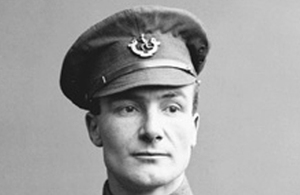WW1 Canadian VC recipient Frederick George Coppins
The story of Canadian First World War Victoria Cross recipient Frederick George Coppins.

Frederick George Coppins [Credit: National Defence Canada]
70 men from Canada received the Victoria Cross, Britain’s highest award for gallantry, during the First World War. As part of the Centenary Commemorations the people of the United Kingdom marked their gratitude to those courageous men by presenting a bronze memorial plaque to their home country engraved with their names. The plaque is now displayed at the British High Commission Ottawa. This archive tells their stories.
Name: Frederick George Coppins
DOB: 25 October 1889
Place of Birth: Charing, Kent, England
Place of Action: Amiens
Rank: Corporal
Regiment: 8th Infantry Battalion, Canadian Expeditionary Force
Frederick George Coppins was born in Kent, England, on 25 October 1889 and served in the British Army before emigrating to Canada. During the First World War, he served with the 8th Infantry Battalion of the Canadian Expeditionary Force.
Corporal Coppins was awarded his Victoria Cross for his actions on 9 August 1918 east of Amiens, France when his platoon was pinned down by an unexpected attack from machine gun fire. His citation explains further:
For conspicuous bravery and devotion to duty when, during an attack, his platoon came unexpectedly under fire of numerous machine guns. It was not possible to advance or to retire, and no cover was available. It became apparent that the platoon would be annihilated unless the enemy machine guns were silenced immediately. Cpl. Coppins, without hesitation, and on his own initiative, called on four men to follow him and leapt forward in the face of intense machine-gun fire. With his comrades he rushed straight for the machine guns. The four men with him were killed and Cpl. Coppins wounded. Despite his wounds he reached the hostile machine guns alone, killed the operator of the first gun and three of the crew, and made prisoners of four others, who surrendered. Cpl. Coppins, by this act of outstanding valour, was the means of saving many lives of the men of his platoon, and enabled the advance to be continued. Despite his wound, this gallant N.C.O. continued with his platoon to the final objective, and only left the line when it had been made secure and when ordered to do so.
After the war, Coppins returned to Canada to live. He later moved to the USA, and died in California in 1963.